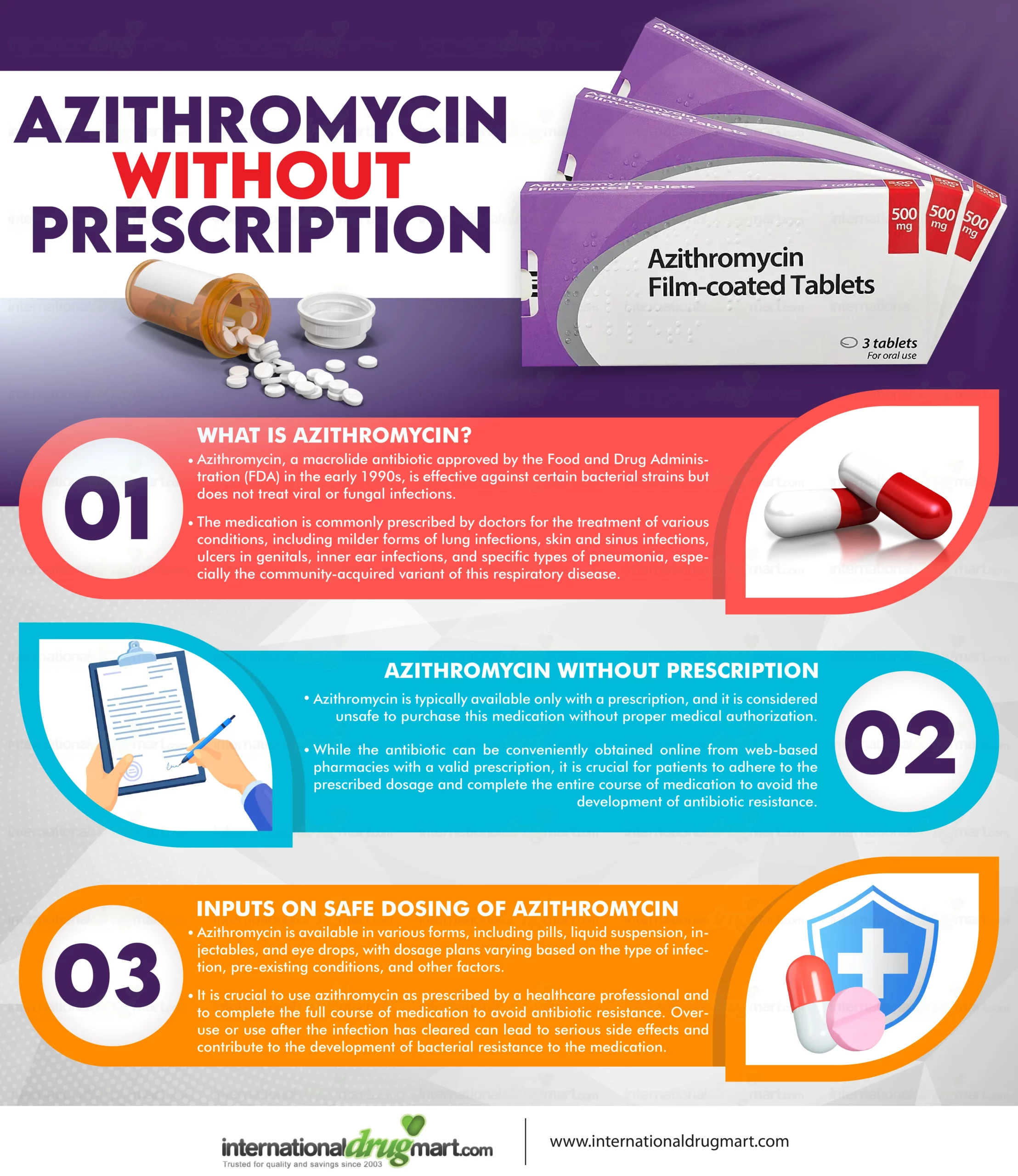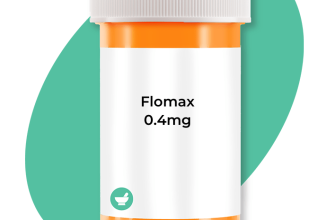Considering purchasing azithromycin without a prescription? It’s important to weigh the benefits against the potential risks. Azithromycin is an antibiotic that treats various infections, such as respiratory and skin infections. Accessing this medication without a prescription may seem convenient, but understanding its proper use and possible side effects is key to ensuring your health.
Before acquiring azithromycin, be aware that self-prescribing can lead to misuse and antibiotic resistance. Misuse of antibiotics is a growing concern, and it’s vital to approach treatment with caution. If you suspect a bacterial infection, consulting a healthcare professional is the best course of action. They can accurately diagnose your condition and advise whether azithromycin is appropriate.
If you decide to proceed with obtaining azithromycin, consider reputable online pharmacies that require a consultation with a licensed healthcare provider. This not only ensures that you receive the correct medication but also helps prevent complications that may arise from improper use. Staying informed about the medication’s uses and risks is crucial for your safety.
- Azithromycin with No Prescription
- Understanding the Risks
- Alternatives to Consider
- Understanding Azithromycin: Uses and Benefits
- The Risks of Purchasing Azithromycin Without a Prescription
- Health Risks
- Lack of Proper Diagnosis
- How to Identify Quality Sources for Azithromycin
- Check Licensing and Accreditation
- Evaluate Customer Reviews
- Legal Implications of Buying Azithromycin Without a Prescription
- Alternatives to Azithromycin You Can Consider Without Prescription
Azithromycin with No Prescription
Purchasing azithromycin without a prescription can lead to potential health risks. It’s crucial to consult a healthcare professional before using this antibiotic to ensure it is appropriate for your condition. Self-diagnosis may result in ineffective treatment or complications, especially if you have underlying health issues or are taking other medications.
Understanding the Risks
Using azithromycin improperly can contribute to antibiotic resistance, making future infections harder to treat. Side effects like gastrointestinal disturbances can occur, and the drug may interact negatively with other substances. Therefore, obtaining a prescription allows a healthcare provider to evaluate your specific situation, recommend the correct dosage, and monitor your progress.
Alternatives to Consider
If you are unable to see a doctor for a prescription, consider consulting a pharmacist or a healthcare service that offers telehealth. They may provide guidance on over-the-counter options or alternative treatments that can be effective for your condition. Always prioritize your health and follow professional advice rather than self-medicating.
Understanding Azithromycin: Uses and Benefits
Azithromycin is commonly prescribed to treat various bacterial infections. It effectively combats respiratory infections, skin conditions, and certain sexually transmitted diseases. The antibiotic disrupts protein synthesis in bacteria, halting their growth and allowing the body’s immune system to eliminate the infection.
For respiratory issues, azithromycin is particularly effective against sinusitis and pneumonia. Patients experience relief from symptoms faster compared to some other antibiotics. It also plays a significant role in treating bronchitis, easing inflammation and promoting recovery.
Skin infections such as acne can benefit from azithromycin’s anti-inflammatory properties. By reducing bacteria on the skin and minimizing inflammation, it helps achieve clearer skin. Additionally, it’s used in treating conditions caused by Chlamydia trachomatis, contributing to public health efforts in preventing the spread of STDs.
The medication is available in various forms, including tablets and suspensions, making it convenient for diverse patient needs. A common regimen includes a higher initial dose followed by lower daily doses, simplifying the treatment process.
Azithromycin’s safety profile is favorable, with fewer side effects compared to other antibiotics. Mild gastrointestinal issues may occur, but severe reactions are rare. Always consult a healthcare professional before starting treatment, even when considering options without a prescription, to ensure it’s appropriate for your condition.
In conclusion, azithromycin serves as a versatile tool in combating bacterial infections. Its ability to address respiratory illnesses, skin conditions, and STDs, alongside its convenient dosing schedule and favorable safety profile, makes it a valuable option in healthcare.
The Risks of Purchasing Azithromycin Without a Prescription
Buying Azithromycin without a prescription exposes you to several serious risks. First and foremost, there’s the potential for misuse. Azithromycin is an antibiotic that treats specific bacterial infections. Using it for viral infections, like the common cold or flu, can lead to drug resistance and ineffective treatment in the future.
Health Risks
Taking Azithromycin without proper medical guidance may result in adverse reactions. Serious side effects can occur, including heart problems, liver damage, and allergic reactions. Without a prescription, you won’t receive monitoring for these side effects. Furthermore, dosing inaccuracies may lead to treatment failures or severe complications.
Lack of Proper Diagnosis
Purchasing this medication without a prescription means skipping a crucial step: diagnosis. A healthcare professional evaluates your symptoms, ensuring that Azithromycin is appropriate for your condition. Misdiagnosis can lead to wrong treatments, prolonging illness or worsening health.
| Risk | Description |
|---|---|
| Drug Resistance | Using antibiotics improperly can cause bacteria to become resistant, making them harder to treat. |
| Side Effects | Possible severe side effects include allergic reactions and heart complications that require medical attention. |
| Misdiagnosis | Skipping professional diagnosis risks using the drug for the wrong illness. |
Always procure medications like Azithromycin through authorized channels, ensuring safe and effective treatment. Prioritize your health by consulting with a healthcare professional before taking any antibiotics.
How to Identify Quality Sources for Azithromycin
Prioritize sources that operate within the legal framework of your location. Check if the source requires a valid prescription. Reputable pharmacies will ask for this, ensuring you receive appropriate guidance.
Check Licensing and Accreditation
- Look for pharmacies accredited by organizations such as the National Association of Boards of Pharmacy (NABP).
- Verify that the site displays a pharmacy license number, which can often be checked through state pharmacy boards.
Evaluate Customer Reviews
- Read customer feedback on trusted review platforms to gauge overall satisfaction.
- Look for detailed reviews that discuss product quality and customer service experiences.
- Be cautious of sites with mostly positive reviews; seek out balanced perspectives.
Confirm the presence of a licensed pharmacist available for consultation. This can often be found on the website’s contact page. A trustworthy source provides an avenue for asking medication-related questions.
Analyze the website design and information availability. Quality sources feature clear contact details, a physical address, and professional layout. Avoid sources that lack transparency about their operation.
Research the pricing of Azithromycin. If the price appears too low compared to market standards, it might indicate a potential risk. Ensure the source offers realistic pricing aligned with typical ranges.
Lastly, beware of overly aggressive marketing tactics, such as unsolicited emails or advertisements promising quick fixes. Reliable sources focus on patient care rather than high-pressure sales techniques.
Legal Implications of Buying Azithromycin Without a Prescription
Buying Azithromycin without a prescription can lead to several legal consequences. Many countries classify this antibiotic as a prescription-only medication, meaning that obtaining it without a valid prescription is illegal. Engaging in this practice can expose individuals to fines or other penalties, depending on local regulations.
Online pharmacies may offer Azithromycin without a prescription, but purchasing from unverified sources increases risks. These operations may not comply with legal standards, putting customers at risk not only of receiving substandard or counterfeit medications but also of facing legal action.
Some jurisdictions may implement stricter controls on antibiotics to combat misuse and resistance. Purchasing without a prescription could attract scrutiny from law enforcement agencies, particularly if it suggests intention to misuse the drug.
Potential buyers should consider the consequences not only from a legal standpoint but also for their health. Consulting a healthcare professional ensures safe usage and appropriate treatment for infections, helping avoid complications that may arise from self-medication.
To stay on the right side of the law and safeguard health, always seek a prescription from a qualified healthcare provider before acquiring Azithromycin or other prescription medications.
Alternatives to Azithromycin You Can Consider Without Prescription
Consider using Amoxicillin for bacterial infections. It’s widely available and effective against various strains. It treats respiratory tract infections, skin conditions, and urinary tract infections.
Doxycycline is another option. This antibiotic is useful for treating acne, respiratory infections, and Lyme disease. It provides a flexible dosing schedule, making it easy to integrate into your routine.
Clindamycin serves as an alternative for those allergic to penicillin. It effectively targets skin infections and certain dental infections. Take it as directed to avoid potential digestive issues.
If you’re looking for over-the-counter solutions, Sugars and honey can help soothe throat infections. Warm salt water gargles may also ease discomfort and provide mild relief.
For viral infections, consider natural remedies like echinacea and elderberry extracts. They may support immune function and reduce the duration of symptoms.
Finally, consult with a pharmacist for additional recommendations tailored to your specific needs. They can guide you to suitable alternatives based on your health status.










